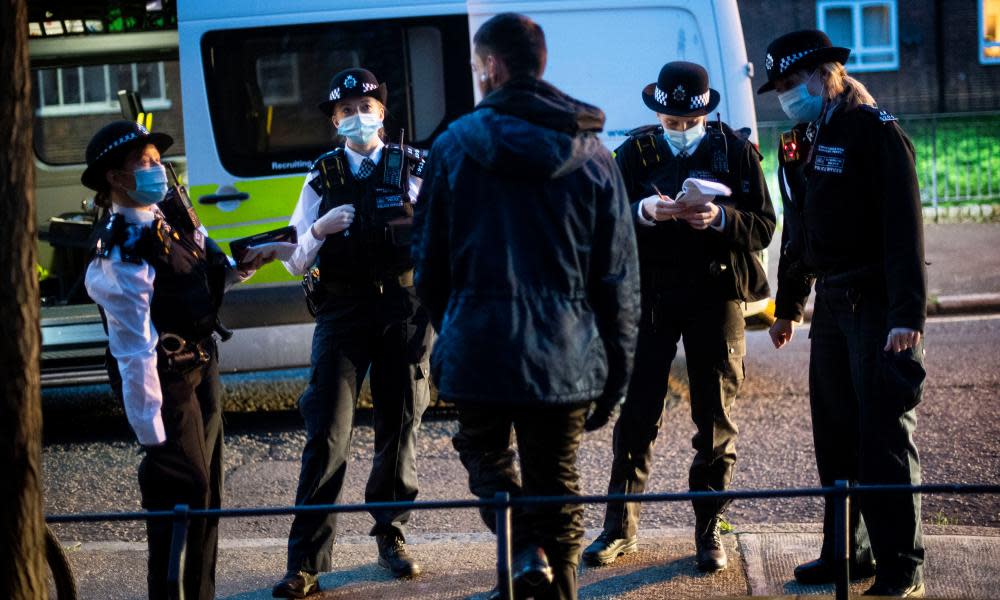Policing minister defends changes to stop and search in crime plan

The policing minister has defended plans to ease restrictions on stop and search powers for police, saying there is no feasible alternative if knife crime is to be tackled.
Amid alarm from campaigners at the permanent relaxation of section 60 powers for police in England and Wales to search anyone for a weapon if they have “reasonable grounds” to think they are involved in crime, Kit Malthouse said there were few other options.
The powers were restricted in 2014 by Theresa May when she was home secretary so they could only be used if police believed there was an immediate violent threat, during a limited number of hours.
Those restrictions were eased by Priti Patel in 2019 to allow police to carry out searches 24 hours a day and on grounds of possible violence. These changes will be made permanent under the government’s crime-fighting proposals.
Human rights group Liberty said the powers were discriminatory, but Malthouse said: “I am afraid I just don’t agree with that … I often say ‘OK, if we can’t do stop and search what else can we do?’ But it has to be something we can do tonight.”
He said the powers were necessary while long-term crime reduction measures were introduced.
“We know that those people with knives in their pockets going out to injure and kill are out there tonight, and if I were a parent of one of these young men, and it is often young men sadly, I would want to know that the killers might have been stopped and searched on the way to perpetrating that awful act,” he said.
“To those people who are critics of the tactics, I would say look at the numbers, particularly somewhere like London, and tell us what the tactic should be instead. There’s long-term work, I agree, it is not the long-term solution. But in the short term it can have a big impact on suppressing knife crime.”
Boris Johnson will launch the plan later on Tuesday, but both he and Patel are facing a backlash on pay from frontline police officers.
On Tuesday, the chairman of the Police Federation, John Apter, will take a letter to No 10 setting out officers’ anger at the pay freeze.
The Police Federation of England and Wales, representing more than 130,000 officers, passed a motion of no confidence in Patel last week.
Johnson said the “beating crime plan” was part of the commitment to “levelling up” parts of the country plagued by crime and antisocial behaviour, but Labour criticised the strategy as lacking vision and said police were demoralised.
Andy Burnham, the mayor of Greater Manchester, said he had a “real concern” about the government’s proposal to increase the use of stop and search.
He said he was particularly worried about the increased use of the section 60 powers. “We have a real concern about the move in this direction and it will need to be dealt with with great caution. We support stop and search as a tool that the police need at their disposal, but it has to be used with real care,” he said.
A report into race equality in Greater Manchester police (GMP) on Tuesday found that black people in the region were 5.3 times more likely to have been stopped and searched than their white counterparts. Despite this, black people searched were only marginally more likely to be found to be carrying anything illegal, with 27.5% of searches on black people resulting in an arrest, caution, summons, or other penalty, compared with 25.9% for white people.
Among the proposals is a pledge to give all victims of crime a named officer to deal with their reports, a move the Labour leader, Keir Starmer, dismissed as a “ridiculous gimmick” that would be an easy promise to break.
Offenders doing community service will wear hi-vis as they clear canals or clean graffiti and the plan will also trial the use of alcohol tags – which detect alcohol in the sweat of offenders guilty of drink-fuelled crime – on prison leavers in Wales.

 Yahoo News
Yahoo News 
